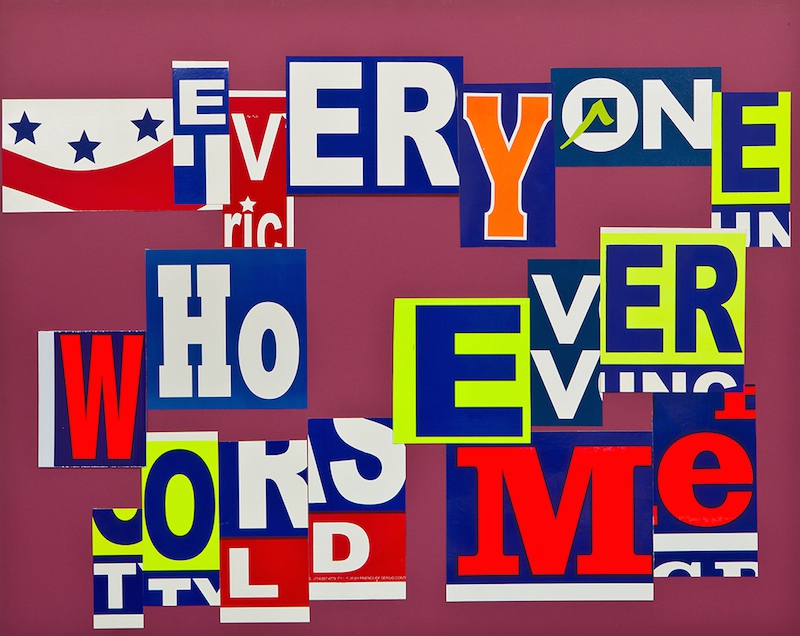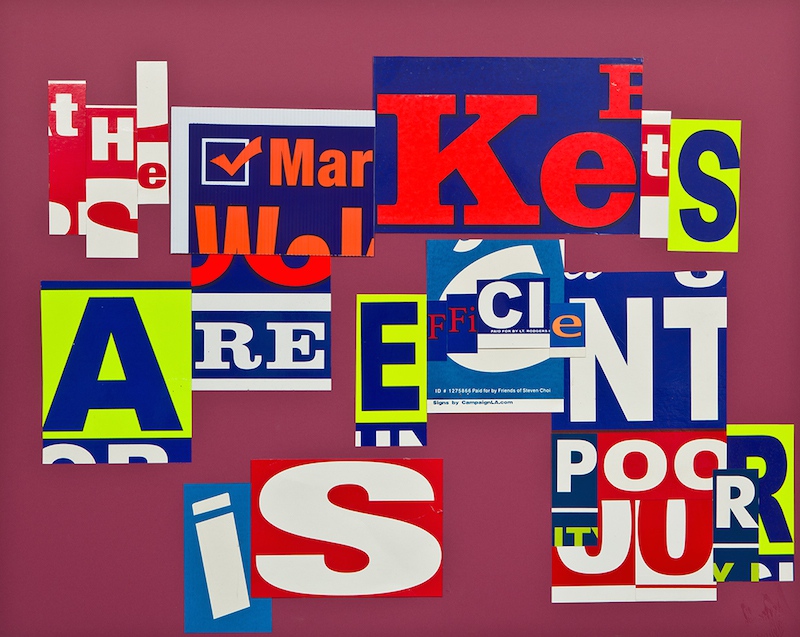Nikhil Murthy
'Ransom Note: Everyone Who Ever told me the Markets are Efficient is Poor, 2008
Archival Inkjet, Diptych, 25 x 31 inches (each), edition of 3
Price: $200


In 1966 Paul Verhoeven, the future director of Robocop, Showgirls and Starship Troopers, is just out of the Navy and struggling to find work in the Dutch film industry. In the 1997 biography Paul Verhoeven by Rob Van Scheers, Verhoeven recounts an important experience from that time. He has recently found out that his girlfriend is pregnant and this, compounded with anxiety about his career, contributes to a state of vulnerability. Verhoeven accepts a religious pamphlet on the street and ends up at a Pentocostal church watching the parishioners speak in tongues. “The weird thing,” he says, “was that you could physically feel — because that was what it was all about — the Holy Ghost descending, as if a laser beam was cutting through my head and my heart was on fire.” This experience convinced Verhoeven of the fragility of his psyche. The ease in which his rational mind could be overtaken by this group psychological experience terrified him. This fear drove many of his film making decisions. His work began to concentrate on the material and physical as a bulwark against the fear of his rational mind slipping away.
The feeling that your own mind can betray you is a humbling thing, especially when you realize the speed with which it can happen. In 2008 the financial crisis hit. Immediately the stock market crashed and social and political panic set in. Most people didn’t really know what exactly was happening, but that didn’t stop certain individuals from talking about it and the rest of us from listening to them. I definitely was listening. I, as someone who believed himself aware and politically literate, needed to be informed about this. Where could I turn for good information? TV news seemed pretty clueless and newspapers weren’t exactly things I could read while at work. The answer was clear: NPR.
The big concern at the moment was the “bailout” and whether or not it would pass. If you recall, congress had rejected the original proposal and the Treasury Department and many of our politicians were working hard to make sure the second version of it would pass. NPR felt the fear of the leadership class and made sure to let all of us know how dangerous it was to let the bailout flounder. “Doing nothing is not an option,” I remember hearing, and I believed it.
I like to think of myself as kind of a free thinking guy, and certainly not a fan of big banks and their interests. However, I completely succumbed to the mass fear I was experiencing while listening to NPR. I became emotionally invested in the idea of the bailout passing, and when it finally happened I was definitely relieved.
The feeling of relief didn’t last long, though. Once the physical feelings of anxiety and confusion lifted, I realized what a sucker I had been and how quickly I could be scared into supporting something that I would rationally recognize as regressive and self-serving. The ease with which my convictions were turned on their head was eye-opening. This led to a new direction in my research and work. I decided I could no longer rely on second hand knowledge of something as important as the economy. I began learning about how banking, money creation and debt work. I researched how a nation’s private and public sectors interact with each other; how a fiat currency changes most of the notions we have about debt and taxes. It became clear how the language of popular economics is really a secular way to speak about moral values. I buried myself in the operational and technical facts in order to inoculate myself from the Passion play that is most economic reporting. All this has allowed me to realize how man options we truly have when it comes to structuring and talking about our economy.
I haven’t listened to NPR since.
Nikhil Murthy is an artist living and working in Los Angeles. Originally from Irvine CA, he received his MFA from The California Institute of the Arts in 2006 and his BA in Visual Art and BS in Physics from UCSD in 2001. Nikhil works in video and sculpture. His work uses elements and ideas from politics, television, hip-hop, science and economics to discuss the possibilities of time, space, empathy, dignity and antagonism. His work has been exhibited throughout the U.S. including Armory Center for the Arts in Pasadena, LAXART, The Dependent Art Fair with Regina Rex, a solo project in Austin, TX at the Austin Museum of Art – Arthouse, and most recently Five Car Garage at Emma Gray Gallery. Additionally his work has been discussed in ASPECT: The Chronicle of New Media Art and his writing has appeared in Marcel.
